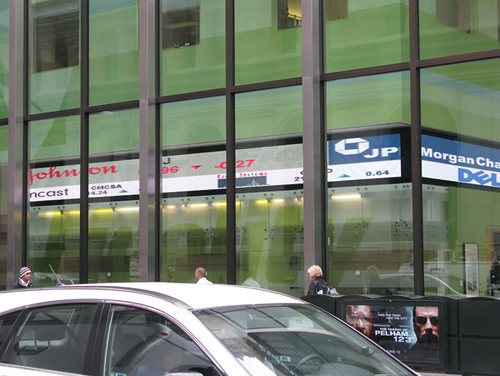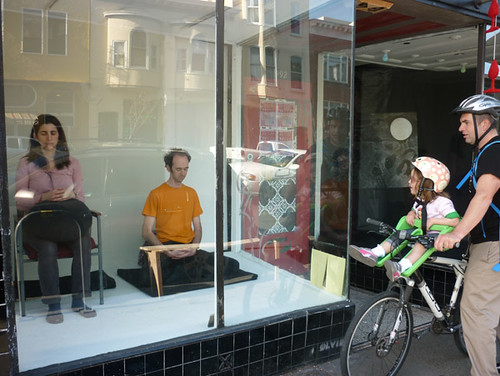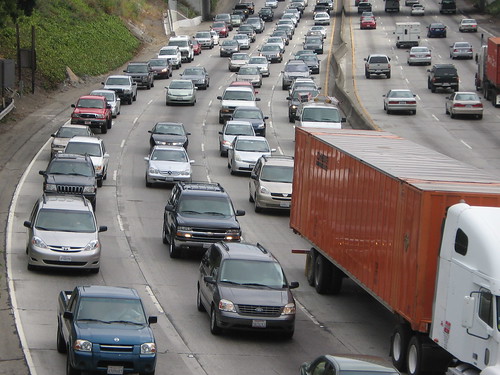Slow Money 3rd National Gathering, October 12-14, Fort Mason, San Francisco
 One of the greatest things that has come out of OccupyWallStreet so far is that everyone is beginning to talk and think about what exactly it is that could be done to change the predicament we’re in. The problem is that our whole money/trade/investment system has become so big and convoluted that it’s hard to tell who is doing what, how and when. This globalized financial labyrinth is the perfect festering breeding ground for greedy speculators who can always stay several steps ahead of the next regulation and spread their shady dealings around without ever having their names and schemes appear in this turgid money-laundering swamp.
One of the greatest things that has come out of OccupyWallStreet so far is that everyone is beginning to talk and think about what exactly it is that could be done to change the predicament we’re in. The problem is that our whole money/trade/investment system has become so big and convoluted that it’s hard to tell who is doing what, how and when. This globalized financial labyrinth is the perfect festering breeding ground for greedy speculators who can always stay several steps ahead of the next regulation and spread their shady dealings around without ever having their names and schemes appear in this turgid money-laundering swamp.
Because the corruption and diffusion is so entrenched in the entire global capitalistic system, it’s also difficult to pin down the problem to a few bullet points and offer any easy solutions. That, of course, plays right into the hands of the greedy bankers and speculators, who conveniently say that if you don’t have any viable alternatives we’d be best advised to keep the status quo, lest we sink that rotting ship. Thus we get “To big to fail.” It also makes it difficult for those who know things are wrong and are protesting the greed and abuse to come up with clear answers about what to do about the problem.
There are a lot of common sense fixes like better regulations, reinstating the Glass–Steagall Act, publicly financed elections, etc. However, as we are finding ourselves on the precipice of a completely overburdened planet — speeding towards 7 billion humans, dwindling natural resources, a rapidly changing climate, loss of top soil and biodiversity, and ever increasing social and economic injustices — we must also think broader, deeper, and in more fundamental terms about the future of humankind on this planet.
The underlying premise of what needs to happen is really quite simple:
WE’VE GOT TO SLOW THE PACE!

 Think about it. Everything that is causing us the biggest problems is related to perpetual growth at breakneck speed. Fossil fuels are quickly being depleted and ridiculous amounts of carbon released into the atmosphere, because of our desire to go farther and faster all the time. Our soils are depleted and our food is making us sick because we are growing crops in huge monoculture plots to ship ever more food with less nutritional value around the country and the world. Likewise, our financial households are in utter disarray, because we’ve allowed a system of exchange to thrive where currency or the value it pretends to represent gets shuffled around ever more quickly and lavishly, ever more obtusely and disconnected from any real life value. The only ones who can win in this global game of make-belief speed poker are the professional pick pockets and the house who is dealing the cards.
Think about it. Everything that is causing us the biggest problems is related to perpetual growth at breakneck speed. Fossil fuels are quickly being depleted and ridiculous amounts of carbon released into the atmosphere, because of our desire to go farther and faster all the time. Our soils are depleted and our food is making us sick because we are growing crops in huge monoculture plots to ship ever more food with less nutritional value around the country and the world. Likewise, our financial households are in utter disarray, because we’ve allowed a system of exchange to thrive where currency or the value it pretends to represent gets shuffled around ever more quickly and lavishly, ever more obtusely and disconnected from any real life value. The only ones who can win in this global game of make-belief speed poker are the professional pick pockets and the house who is dealing the cards.
The truth is that in addition to new laws and regulations the changes that we need require a deeper look in the mirror into what our values as a people and a society are. We’re so addicted to speed and expediency that the mere thought of slowing down or downsizing evokes dearth and sacrifice. We’re so trained to equate convenience and endless choices and stuff with progress that we forget that in the end what gives our lives meaning are often the simple, basic and direct interactions with one another, matters of the heart. As Steve Jobs said so eloquently:
Almost everything — all external expectations, all pride, all fear of embarrassment or failure – these things just fall away in the face of death, leaving only what is truly important. Remembering that you are going to die is the best way I know to avoid the trap of thinking you have something to lose. You are already naked. There is no reason not to follow your heart.
 It’s true and important to remember: Everything is impermanent and we’re all going to have to let go of everything we’ve accumulated. So the most valuable thing I believe we have on this earth is our capacity to love, to care for one another, to express ourselves and listen to others, to marvel at the beauty of life on this little round ball we all share.
It’s true and important to remember: Everything is impermanent and we’re all going to have to let go of everything we’ve accumulated. So the most valuable thing I believe we have on this earth is our capacity to love, to care for one another, to express ourselves and listen to others, to marvel at the beauty of life on this little round ball we all share.
People around the world are beginning to understand that. They are walking and riding their bikes not only because it lowers their carbon footprint and relieves congested roads, but because life is so much more fun and meaningful when we wander through it more slowly and deliberately, making connections along the way that feed our souls. They are buying food from their local farmers not only because it promotes healthy soil and food and reduces transport and CO2 emissions, but because shaking the hand that feeds you makes life more meaningful, puts a smile on your face, and gives us interesting stories to share around the dinner table.
And so it is with money. When we bring back money to represent actual physical or emotional value, we not only take it out of the black hole of obscure transnational speculation, but we bring it back to planet Earth and our communities, where it can be an agent of meaningful exchange and interaction that feeds not only our bellies but our soul.
The good news is that a lot of great work to congeal these underlying ideas into functioning systems has already be done. For example, the Slow Money Principles to me encompass a great response to anyone asking what it is that I actually want:
The Slow Money Principles
In order to enhance food security, food safety and food access; improve nutrition and health; promote cultural, ecological and economic diversity; and accelerate the transition from an economy based on extraction and consumption to an economy based on preservation and restoration, we do hereby affirm the following Slow Money Principles:
I. We must bring money back down to earth.
II. There is such a thing as money that is too fast, companies that are too big, finance that is too complex. Therefore, we must slow our money down — not all of it, of course, but enough to matter.
III. The 20th Century was the era of Buy Low/Sell High and Wealth Now/Philanthropy Later—what one venture capitalist called “the largest legal accumulation of wealth in history.” The 21st Century will be the era of nurture capital, built around principles of carrying capacity, care of the commons, sense of place and non-violence.
IV. We must learn to invest as if food, farms and fertility mattered. We must connect investors to the places where they live, creating vital relationships and new sources of capital for small food enterprises.
V. Let us celebrate the new generation of entrepreneurs, consumers and investors who are showing the way from Making A Killing to Making a Living.
VI. Paul Newman said, “I just happen to think that in life we need to be a little like the farmer who puts back into the soil what he takes out.” Recognizing the wisdom of these words, let us begin rebuilding our economy from the ground up, asking:
* What would the world be like if we invested 50% of our assets within 50 miles of where we live?
* What if there were a new generation of companies that gave away 50% of their profits?
* What if there were 50% more organic matter in our soil 50 years from now?
So to those who are asking what I want, I say…
SLOW THE MONEY DOWN!
o~O~o~O~o~O~o~O~o~O~o~O~o~O~o~O~o~O~o
Visit Slow Money for more info.
Additional Resources:
Slow Food
Slow Travel
Responsible Credit Cards
Social Investment Forum
Move Your Money
Common Good Bank
Green Money Journal








Always enjoy your Dailykos comments too.
You may be aware of SlowFood (and Travel) movements.
Perhaps you might link up with these global organizations and/or refer to them. Maybe synchronicity for the Slow Food and “slow money”
Keep up the good work.
As a ex- Montrelais your food porn article also was great, wish I still lived in la belle province.
D. King-Powell
Great idea, D. King Powell, I added Slow Food and Slow Travel to the resources. I’ve been familiar with Slow food for quite some time but only recently heard about slow travel. I’ve always preferred to stay in one place and get to know the local customs and daily life more deeply. Great to have an organization dedicated to promoting these values, as more and more people are just jet-setting all over the place. And speaking of staying in one place, I was in Montreal for two weeks and enjoyed every minute of it. What a great place! I’ve got some more posts on bikes and urban gardens in Montreal coming soon. Thanks for stopping by!
Hi Sven,
I’m assuming someone asked you what you wanted. I’m sure glad they did.
Thanks for putting your thoughts and emotions on the line, with all these incredible links.
Pam
Haha Pam, that’s a good one. Of course nobody asked me, but I thought I’d answer anyway. 😉 As a matter of principle I try to listen at least as much as I speak, but as I’ve been listening for a while to all kinds of takes on this issue I thought I’d chime in real quickly.
In all countries, including the USA, Greece, and Spain, there are considerable portion of the population of each generation that might be labeled as the “Half-wayers”. These are the unsuccessful but still they are grateful and defendant of the socio-economic system in place. They are mostly of older ages, but still you can find them in less ambitious youth.
The Half-wayers are middle-classers who feel indebted to the unjust and corrupt system because deep in their hearts and minds they believe that they have achieved and acquired more than what they fairly and normally deserve. This kind of people might not be corrupt; but they assume that without such system they would have been ruined and abject losers. This is the only reason why they defend the system meekly and brutally; or at least fear and reject any movement that might bring possible change.
http://tariganter.wordpress.com/2011/10/08/wall-street-half-wayers-of-generations/
Nicely done, Sven. And precisely because the Occupy WSers are having big time messaging trouble, I’m going to bring along copies of your post with me next time I go down there. I think it will be useful.
Nice! I love it all: The fact that you’ve been down there for support and that this way I can “come along” in your pocket. 😉 It would be cool if the Slow Money organizers could broadcast live from the conference on a big screen down on Wall Street.
Instead of frantically typing up my next blog post (due tomorrow), I’m going to simply suggest folks slow down and read your message. OK?
Great idea, Ruth. I may have to take up on that idea in reverse one of these (busy) days. 🙂
Sounds perfect, Ruth. If I can contribute to lowering your stress level, that makes me happy!
Nice post Sven. I completely agree with the need to do away with speed because it is addictive and wasteful. The Earth needs time to heal and there is no way to buy the time needed to do this. Life is more pleasurable when we stop being in such a hurry to go no where. I’m starting to feel really good about the generation of younger Americans who are questioning the way things have become and realize genuine changes are imperative.
Albertus, I really like thinking of it in terms of needing time to heal. It reminds me of the many times in my soccer-playing youth when I had an injury but wasn’t patient enough to let it heal completely. I went back on the field before my knee or ankle was completely healed, and almost without exception I would re-injure it. I think it’s the same with the planet we live on — we’ve burdened it so much to the point of collapse, but instead of slowing the pace to allow for natural healing we’re running around like crazy in search of an ambulance.
There’s a Pennsylvania Dutch saying, “The hurrieder I go, the behinder I get.”
I felt like life only really began to make sense for me when I learned how to meditate and that, of course, meant slowing to a stop from time to time.
If money is meant to be a symbol for value, we should first be taking the time to understand what it is we value before we spend money or before we try to persuade others to spend it.
…really appreciate this discussion. Thanks.
Well said, Lark. One of the big problems I think we have is that there is an entire industry — the marketing industry — dedicated to infusing us with the belief that the biggest and perhaps only value of money is to buy things and accumulate stuff, whether we need it or not. I heard somewhere that a lot of the big marketing campaigns aren’t even geared towards buying a particular product anymore, but just to buy… anything.
I’ve never been able to adopt a formal meditation practice but I admire folks who do it.